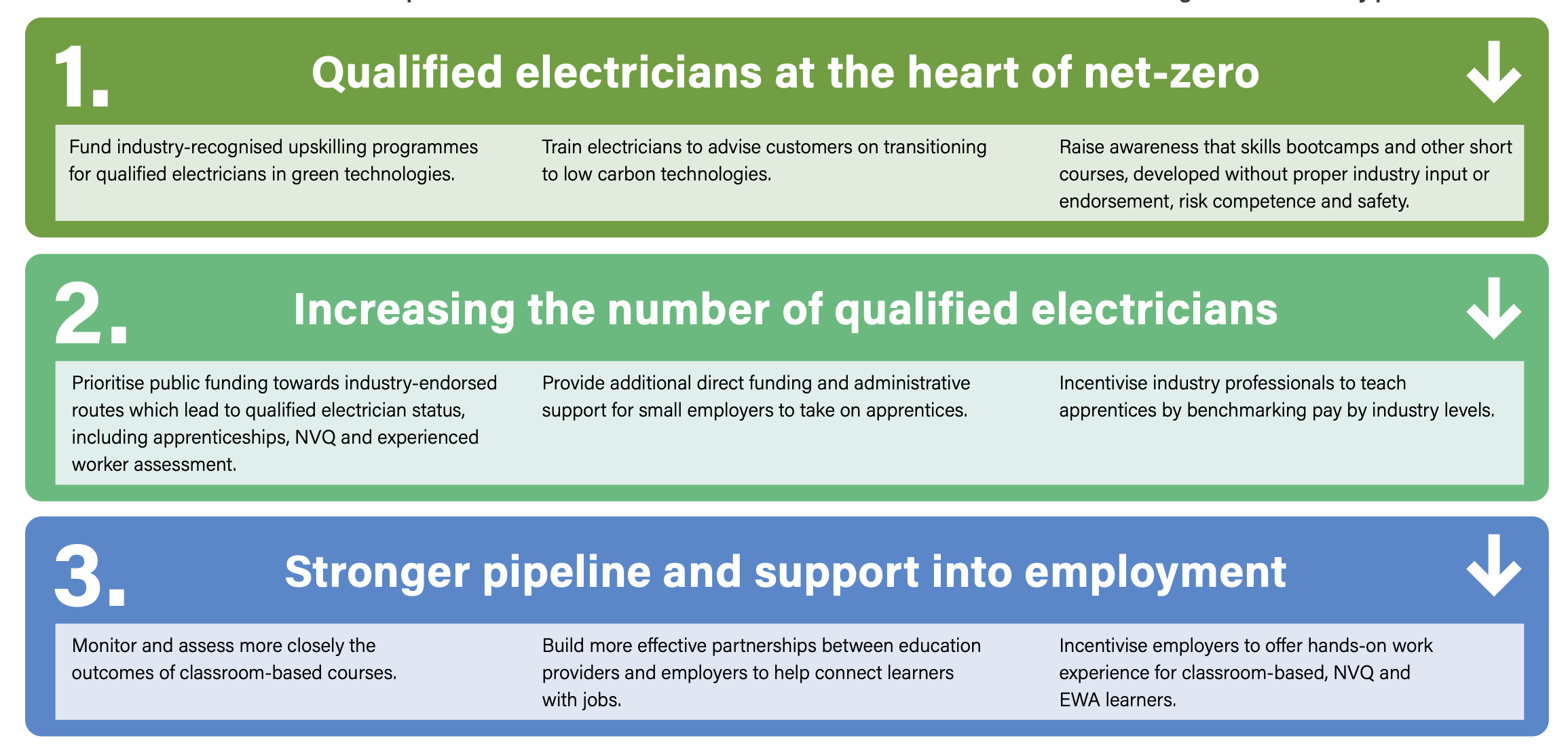Solar energy workforce goals and the ECA Charter to recharge electrical skills
Contents |
[edit] Solar energy workforce goals ambitious but achievable, says new electrical skills research
Achieving the UK government’s target of 70GW of Solar Power by 2035 raises some significant challenges.
One of these is the availability of electricians qualified to install and commission Solar Photo Voltaic (PV) and other low carbon technologies. According to new research commissioned by The Electrotechnical Skills Partnership, the country fortunately needs just 500 more qualified electricians each year to realise its Solar aspirations.
The research, carried out by Pye Tait, shows that for many electrical firms installing Solar PV is not their sole occupation. A fully qualified electrician can upskill to install Solar PV, Energy Storage Systems and other net zero technologies in just a few days. Electrical apprenticeships in England already incorporate training in low carbon and smart technologies, including Solar PV. What’s more, employing qualified electricians provides business agility, as they can integrate a range of different technologies to work efficiently together, all at the same time.
The new data shows that while employers involved in Solar PV currently identify challenges in recruiting and training more electricians, 500 more each year is entirely achievable. With improvements in the skills system and greater collaboration between industry and education, there is a clear path to removing existing obstacles.
[edit] Comment on the new research
Andrew Eldred, ECA’s Director of Workforce and Public Affairs, commenting on the new research said:
“Electrical courses of all kinds are in huge demand, so it’s clear there is no shortage of people wanting to join the industry. The main problem is completing learners’ training to the right, industry-recognised standards. To increase the size of the qualified electrical workforce, we must fix the broken skills pipeline. The Recharging Electrical Skills Charter offers an achievable policy programme to mend the broken pipeline. This will boost the numbers of qualified electricians needed to achieve the UK’s net zero targets”.
[edit] ECA's Recharging Electrical Skills Charter
The Electrical Contractors’ Association (ECA), has recently launched the Recharging Electrical Skills Charter. The Charter calls for closer ties between industry, governments and education, to grow the competent electrical workforce to support the net zero transition. The trade body highlights the importance of electricians to the energy transition. It sees the short-term fix of ‘bootcamp style’ courses for new entrants as a cul-de-sac for learners and industry, as well as a waste of public resources. The full charter can be downloaded here and the introduction reads thus:
In the race toward a net-zero future, electricians are indispensable – essential to the take-up, integration, and maintenance of low-carbon technologies. Yet there simply aren’t enough of them. With the skills system in England blighted by inefficiencies and inadequate ties between education and industry, we must acknowledge that the electrical skills pipeline isn’t working for the profession, people, or the planet. Key challenges include:
[edit] Overlooked electricians
- Electricians are crucial to society and the economy but are too often overlooked by policymakers.
- The safe roll-out of green technologies, like EV chargers, energy storage systems and solar PV, needs the skillset of a competent, qualified electrician.
- Core electrical competencies cannot be learnt at a ‘skills bootcamp’ or other short course.
[edit] Not enough electrical apprentices
- There aren’t enough competent, qualified electricians, with significant differences between regions.
- To maintain the number of electricians we need annual apprentice recruitment to be 5% of the existing workforce each year, but the current average in England is less than 4%.
- Despite shortages, it is not viable currently for many small employers to employ apprentices.
[edit] Broken skills pipeline
- Although vast numbers enrol onto classroom-based electrical courses each year, these courses do not produce qualified electricians, with less than 10% of learners subsequently progressing into an apprenticeship.
- Adult learners hoping to change careers or upskill often struggle to obtain financial or any other support.
- Because of the above, most learners never complete their training - locking thousands of potential electricians out of employment.
[edit] ECA is on mission to recharge electrical skills
It’s time to reimagine the way we recruit, prepare and retain electricians for the challenges and opportunities of a net-zero world. This means upskilling our existing electrician workforce though the kitemark Electrician Plus accredited courses.
We also need a skills pipeline that not only meets the needs of today but anticipates the demands of tomorrow. A pipeline that creates a larger electrician workforce with the knowledge, skills and behaviours necessary to navigate the risks and complexities of energy efficiency and cutting-edge technology.
This article was issued via Press Release as "Solar energy workforce goals ambitious but achievable, says new electrical skills research" dated December 13, 2023 along with extracts from "ECA’s Charter to Recharge Electrical Skills".
--ECA
[edit] Related articles on Designing Buildings.
- Call for support in green electrical apprentice shortfall.
- Electrical sector skills recharge at the House of Commons, as skills shortage bites.
- ECA applauds Chancellor’s 2023 Autumn Statement payment reforms for SMEs.
- Electrical skills shortage in Eastern England.
- ECA helps Welsh Government consultation on Net Zero Skills.
- Industry responds to Prime Ministers Net Zero policy announcement.
- Net zero building higher education and the skills of the future.
- Net zero by 2050.
- Net Zero not possible without right skills.
- Net zero (whole life) carbon.
- Net zero strategy: build back greener.
- National Infrastructure Plan for Skills.
- National vocational qualification.
- Order books fill but skills shortages worry contractors.
- Payments for recruiting new apprentices.
- Recruiting and retaining talent in the construction industry.
- Skilled workforce unable to meet net zero ambitions.
- Skills.
- Skills shortage.
- Skilled workforce unable to meet net zero ambitions.
- Skills shortage.
Featured articles and news
What they are, how they work and why they are popular in many countries.
Plastic, recycling and its symbol
Student competition winning, M.C.Esher inspired Möbius strip design symbolising continuity within a finite entity.
Do you take the lead in a circular construction economy?
Help us develop and expand this wiki as a resource for academia and industry alike.
Warm Homes Plan Workforce Taskforce
Risks of undermining UK’s energy transition due to lack of electrotechnical industry representation, says ECA.
Cost Optimal Domestic Electrification CODE
Modelling retrofits only on costs that directly impact the consumer: upfront cost of equipment, energy costs and maintenance costs.
The Warm Homes Plan details released
What's new and what is not, with industry reactions.
Could AI and VR cause an increase the value of heritage?
The Orange book: 2026 Amendment 4 to BS 7671:2018
ECA welcomes IET and BSI content sign off.
How neural technologies could transform the design future
Enhancing legacy parametric engines, offering novel ways to explore solutions and generate geometry.
Key AI related terms to be aware of
With explanations from the UK government and other bodies.
From QS to further education teacher
Applying real world skills with the next generation.
A guide on how children can use LEGO to mirror real engineering processes.
Data infrastructure for next-generation materials science
Research Data Express to automate data processing and create AI-ready datasets for materials research.
Wired for the Future with ECA; powering skills and progress
ECA South Wales Business Day 2025, a day to remember.
AI for the conservation professional
A level of sophistication previously reserved for science fiction.
Biomass harvested in cycles of less than ten years.
An interview with the new CIAT President
Usman Yaqub BSc (Hons) PCIAT MFPWS.
Cost benefit model report of building safety regime in Wales
Proposed policy option costs for design and construction stage of the new building safety regime in Wales.
Do you receive our free biweekly newsletter?
If not you can sign up to receive it in your mailbox here.




























